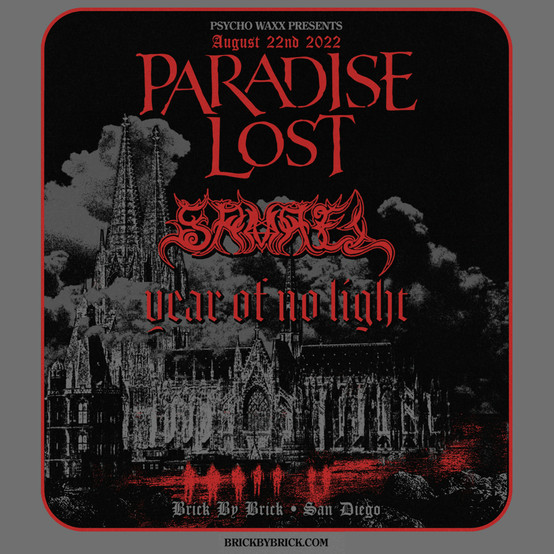I’ve Cried For God: Paradise Lost - Shades of God (1992) Retrospective
- Jul 14, 2022
- 11 min read
On what’s often seen as the “transition album”, frontman Nick Holmes details how the Halifax quintet turned doom’s metallic girth into solid gold treasure.

Words by Tyson Tillotson (@tytilly):
Usually when discussing albums in retrospect, I like to set the scene by talking about the landscape of music at the time. 1992 was no different. A lot of bona fide game changers were released during this year including, to name a few, A Blaze in the Northern Sky, Dirt, The Chronic, Angel Dust, and Vulgar Display of Power. All of these albums in someway or another shaped their respective landscapes beyond description and have become what most people would consider classics. One of those records that seems to go by the wayside due to it being sandwiched between two other genre prime movers is the third record by Halifax based gothic doom pioneers, Paradise Lost, that album being the massive Shades of God. Nestled between death doom monolith, Gothic (1991), and gothic metal titan, Icon (1993), Shades of God represented the band at their most doom laden and, for that time, their most abstract and complex. For yours truly, this record stands as probably one of the band’s strongest statements as well as one of my personal favorites in their lengthy catalog. It’s a record that features some of the band‘s longest tracks as well as the song that would break them into the European metal mainstream and earn them the somewhat sarcastic title of “the UK’s answer to Metallica.” In order to better understand how this record came to fruition along with some of the process that it took to create it and eventually tour the material, I had the utmost privilege of speaking with frontman Nick Holmes about this three decade young doom metal odyssey. So no longer will you need to cry for eternity and wondering how this album came to be, it’s time for us now to pity the sadness.
Let’s first go back nearly 30 years to where the roots of this album would begin. Soon after the release of Gothic and their subsequent tour of the album across Europe with Autopsy, Paradise Lost would find themselves in the situation of needing a new label and a manager to help them on their path to success. Andy Farrow would be the man who would get Paradise Lost into their extremely lucrative record deal with Music for Nations for a four album deal. Further details about this can be found in the book, No Celebration.
As far as the writing for Shades of God was concerned, Holmes said, “The songs probably weren’t done on tour, they were probably done in our rehearsal space…I can’t actually remember writing these songs to be honest!” But Holmes also has confirmed that they did rehearse and possibly demo some of the songs the way they have done it since their demo days: recording directly to tape on what he called, “ghetto blasters with 25 huge backers inside. We’d just kind of record guitar parts at home and then bring them down to the rehearsal space…it was very spontaneous.”

Even with such a primitive way of getting these songs written, the band went all in. Holmes also notes how rehearsing with a PA system around this time was a treat as the home demos could only take them so far. What also seemed to take a momentary pause alongside the home demoing was the band’s noticeable proclivity for goth and goth inspired music. This is one of the reasons as to why Shades of God is often seen as a black sheep: the record is very much a muscular and complex doom metal album rather than a full blown death doom record like its predecessor and a gothic doom powerhouse like it’s successor. When I asked Nick about what the impetus behind this change of sound was, he offered up that the band were “getting more into bands like Trouble and the first Type O Negative album that came out around that time that helped shift us into a heavier sort of thing. I also decided to shift the vocals to half gruff, half clean which, to be honest, was a fucking nightmare. It just comes from the throat, you can only do it for so long you know?”
But as heavy and frankly gargantuan as everything on Shades of God would be from these metal influences, other influences outside of what you would typically consider metal started to creep in. From the band‘s very beginning, Paradise Lost had always expressed their love and appreciation for bands from the Seattle grunge scene. Need proof of that? Look no further than the bands live VHS Live Death and you can spot drummer Matthew “Tuds” Archer sporting the infamous “Crack Smokin, Fudge Packin” Nirvana t-shirt when the latter were still signed to Sub Pop Records. Holmes: “The more metallic elements were influential particularly Alice in Chains even though that first album is quite glammy but Dirt had a massive impact in a metal way like Black Sabbath had. Even Soundgarden as well sounded very Sabbath esque for the first couple of albums.”
We can already take away that Paradise Lost were not willing to continue down an easy road on what was then considered their major label debut. The combining of old school doom in the vein of bands like Sabbath and Trouble would be underscored with a sort of contemporary appreciation for bands from the Pacific Northwest such as AIC, Soundgarden, and Melvins. The band also pulled from some of their earliest influences such as Motörhead, GBH, Venom, and even Aerosmith to which Holmes admits to have never even dreamt of listening to alongside the aforementioned bands. And with this melting pot at a slow boil, the group would begin recording with producer Simon Efemey in Spring of 1992. Holmes knew that Efemey would be perfect for the job as he described him as “a big metal guy from Birmingham who liked Judas Priest and Sabbath. Him being a metal guy he would shout when he would get excited about things which helped during the recording as well.”

I personally believe that some of that shouting definitely did push these five Yorkshiremen to create one incredible piece of music. Opener, Mortals Watch the Day, feels like the clouds opening up and revealing light from above before hitting you with thunderclaps of double bass and Holmes’ throaty baritone coming in full force like God himself bellowing from his seraphic throne. Even though it is one of the shorter songs on the record clocking in at 5:13, it feels like a long and winding epic with enormous peaks and valleys that leave you, as a listener, completely entranced. One of the best moments on the song includes a brief but very effective bass solo from Steve Edmondson before guitarists Greg Mackintosh and Aaron Aedy bring back the controlled madness. Just know, the giant moments do not end here. Crying for Eternity begins with a hanging bended passage from Mackintosh while Archer pounds out a simple funereal beat before Holmes and the others join in. Holmes' lyrics cut deeply with lines like, “All the more, you feed off my rejection (all the more). All the more, I tear your soul in two (all the more).” A brief but soulful solo follows with Edmondson and Mackintosh front and center through to Holmes, Aedy, and Archer reentering the picture. The track concludes with serpentine soloing before fading into obscurity.
“Back then a lot of the recording was about the vibe you know?” is more insight that Holmes offers up about the process the band used during their recording sessions for their third LP. Whatever vibe was felt, it manifested on the deep cut, Embraced. The second shortest song on the album, it’s a doom barn burner if ever there was one. Holmes laments about the end of times and how “life and death becomes a race.” The sort of dual riff attack between Aedy and Mackintosh adds to the somewhat Trouble/Solitude Aeturnus feeling of the track while Edmondson and Tuds hammer home the back end. The first of many lengthy tracks, Daylight Torn, actually holds a special distinction for the band: it’s Holmes’ favorite track from the album.
“I love the format of a song that starts off a certain way and then it kind of goes off on a little musical journey and then it comes back to the end again. Which was always a real trait with the old Mercyful Fate songs, the old King Diamond songs and even Iron Maiden used to do that and I always loved when they’d take you on a little musical journey like that. Daylight Torn has a little bit of that formula.” Boy what a journey that is. As the album's lengthiest cut reaching nearly 8 minutes in length, the band unleash some of their most monstrous riffs and some of their most venomous lyrics. Highlights include, “Your Christ is failing you, like poison running through. Does God know what to do, as I tell the harboured truth?” The riffs and bass are thick enough on this track to feel like you’re chewing on a handful of change and then we reach the 3/4 mark of the track, which introduced one of the album’s most unique trademarks: dark acoustic passages courtesy of Aaron Aedy. For a band that had already broken so many boundaries, this was the band breaking their own personal ones and trying different ideas. The use of acoustic guitar was something they had never tried using before. The section brings to mind Orchid from Black Sabbath's Master of Reality, albeit more foreboding. Just when all seems safe, the band Kool-Aid Man your eardrums back from this soothing interlude with a throat shredding yell from Nick Holmes. We are then treated to a signature Greg Mackintosh solo that feels downtrodden yet ascendent. The band rip through the final sixty seconds with the song coming full circle like Holmes originally pointed out.
As the standalone single, Pity the Sadness is one of the most energetic and dare I say thrashier songs the band have ever done. If it were in E standard tuning, I could almost see this being a Motörhead cut circa Overkill, though I’m pretty sure people would’ve been concerned with Lemmy having lyrics about depression and death that are so unabashedly open shirted. The cut even slows down a bit to let you simmer in those doomed juices that these Yorkshiremen want you to absorb. It’s a fun track to hear in a live setting and it’s also the very first song the band had a music video for. Following track, No Forgiveness, not only has that acoustic guitar featured again, but it opens the track instead of serving as an interlude. Once the soft plucking is gone, the distortion rolls in like a maelstrom. This is one of my personal favorite Paradise Lost songs in general as it carries a grim mood while still having the fist pumping energy that British heavy metal is known for. It also features one of the best Greg Mackintosh solos ever. It also has this semi calm section around the 5:55 mark before leading straight into a nasty floor stomping doom metal breakdown that leads the song back out onto the sea of sorrow. Early set list favorite, Your Hand in Mine, is the final lengthy track on the album and is a showcase in mood building and pay off. Clean vocals from Nick that would foreshadow his styles on Icon and Draconian Times (1995) make their first appearance before he returns to the gruff stuff. The song is a great slow burn that pays off in dividends with some of Aedy’s chunkiest riffs and some nearly progressive metal complex soloing from Mackintosh. There’s even a passage that sounds almost like a military march courtesy of Tuds while stray guitars cut through the fog of the mind.
In the homestretch, we have the penultimate track, The Word Made Flesh. The verse riffing on here is absolutely magical and brings to mind my nearly year long immersion of listening to the album from 2019-2020. We’re also treated to some clever usage of COWBELL(!) that works rather flawlessly on this 4 and half minute bruiser. We then come to the REAL hit from the album, As I Die. As has been detailed by the band numerous times over the years, this track was never intended to be a part of the record but was eventually tacked on to the CD and tape versions and released as a separate EP with B-side cut, Rape of Virtue, and an austere yet solid cover of the Atomic Rooster cut, Death Walks Behind You. Featuring the guest vocals of Sarah Marrion, who also lent her talents on Gothic a year before, Holmes and co. created one of the true doom metal anthems that not only could soundtrack your depressive episode but also hyping someone up before a sporting event. How can you not scream the eponymous phrase every single time you hear it?! The song shot into the European metal mainstream while the two songs that were on the EP were left off as Holmes felt that Rape of Virtue just “didn’t gel” with everything else on the record. And thus, the record ends on an extremely high note and high hopes for the Paradise Lost guys.
Shades of God was released on the 14th of July in 1992 to rapturous praise from the European metal press and the press on the band’s native soil, but in order to expand their reach into the Americas, the band decided to embark shortly there after on a tour with Florida’s Morbid Angel and German thrash vets Kreator. Unfortunately, American audiences weren’t as receptive to Paradise Lost and their brand of gothic tinged doom. The band quickly came to realize that the tour would more than likely be a bust. In fact, the shittiness of the entire tour that resulted from home sickness, lack of funds, hunger, and outright hostility from Morbid Angel prevented Paradise Lost from returning to the States for an entire decade. For this grievous sin, I will never forgive Trey Azagthoth and David Vincent. But not everything was terrible on the band’s trek through America. Holmes recalls the entire band continually playing Type O Negative’s cover of Summer Breeze, “We were playing it so much on the cassette deck on the bus that when I hear it, I usually think of that tour right away.” Nick also took the time to bring his rapier wit to these lucky American audiences who saw these shows. He detailed how when the tour stopped in Seattle, he talked about taking the piss out of the crowd by asking them, “Does anybody like Nirvana? And there was absolute silence!” Unfortunately, dry Northern British humor wasn’t something that grungey burnouts would catch the sarcasm and nuances of. Shortly thereafter in the wake of Shades of God’s success in mainland Europe, the band returned from America licking their wounds but were greeted with nothing short of a hero's welcome by playing enormous headlining shows. Soon after, the band would retire to the studio yet again to craft another future classic. But that’s a story for another day.
When all is said and done, what Paradise Lost accomplished on Shades of God is nothing short of astounding. The band were able to go from one absolutely crucial underground metal record to creating one of the most important steppingstones into the rest of their career and I can confidently say that the history of this entire band would not be the same had they not released a record of this type. In one of my final questions to Nick, I asked him what he thought about the album's legacy and he had this to share regarding it, “It’s actually one of my favorite albums mainly because it’s very guitar driven, it’s a very heavy metal album. We didn’t think about keyboards at this point necessarily or effects or female vocals but it was just a very raw and melodic album and thats why it stands out to me and I think that Greg feels the same way.” In certain respects, I also feel the same way. Depending on my mood, it often seems to shift between this one and Icon, but whenever I need that kind of feeling that came when I first heard it while living in southern Utah while looking up at mountains covered in clouds, I get that forlorn feeling and throw on Shades of God and pity my own sadness. This is an album that will have you pumping your fist at certain points and will also have you contemplating your mortality often within the next measure and it’s this reason why to me it is one of the most important “transitional” records in music history. Without this album, Paradise Lost’s entire trajectory would be in limbo and they would’ve been lost to the sands of time. But thankfully, this record will stand the test of time. Forgive me as I die once more underneath the grandeur of this majestic work that will offer no quarter and no forgiveness for all who dare to tread in God’s shade.
Paradise Lost will be touring the US in August with a slot at Psycho Las Vegas and two one-off shows in San Diego and Los Angeles. Tickets for all shows can be found HERE.












